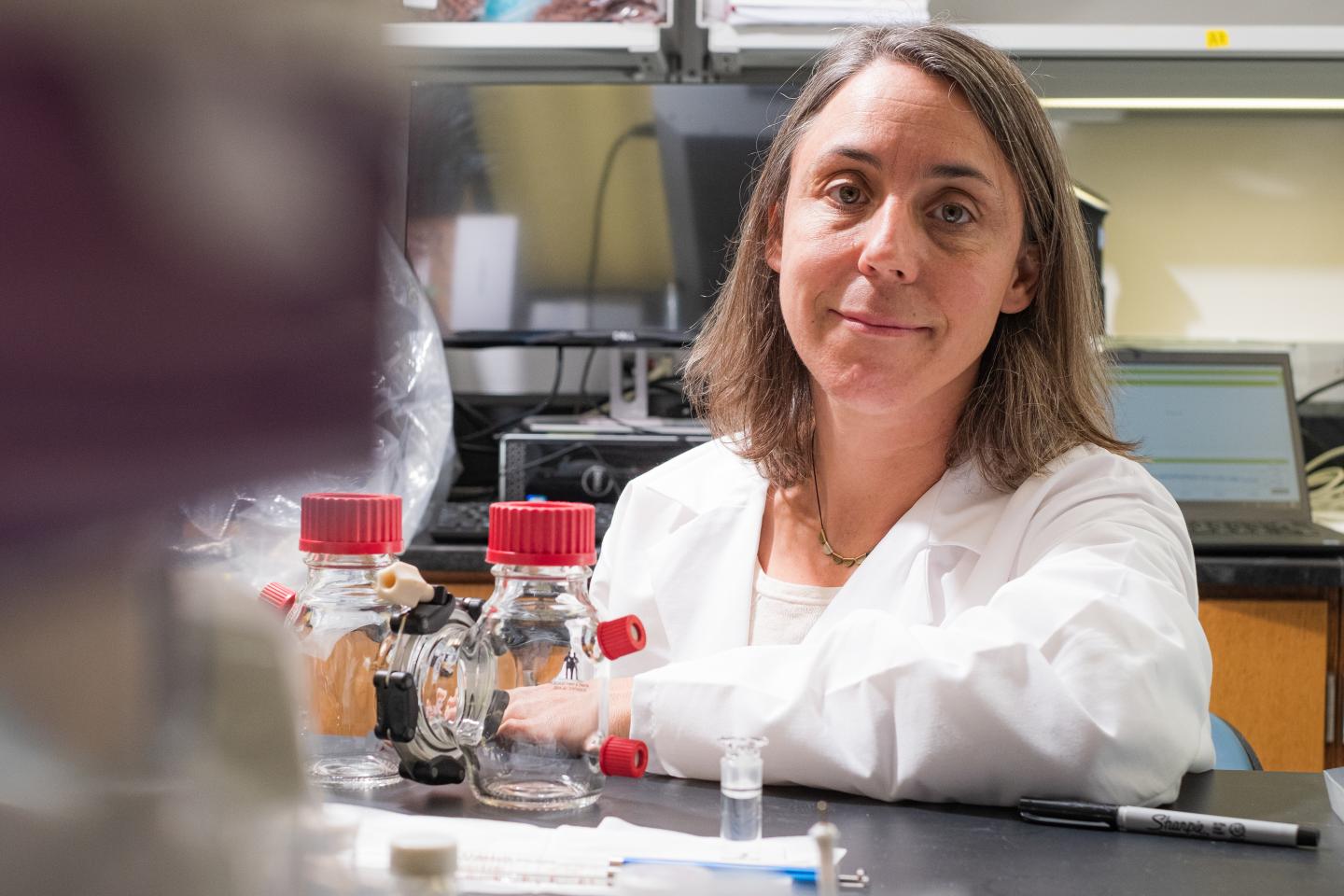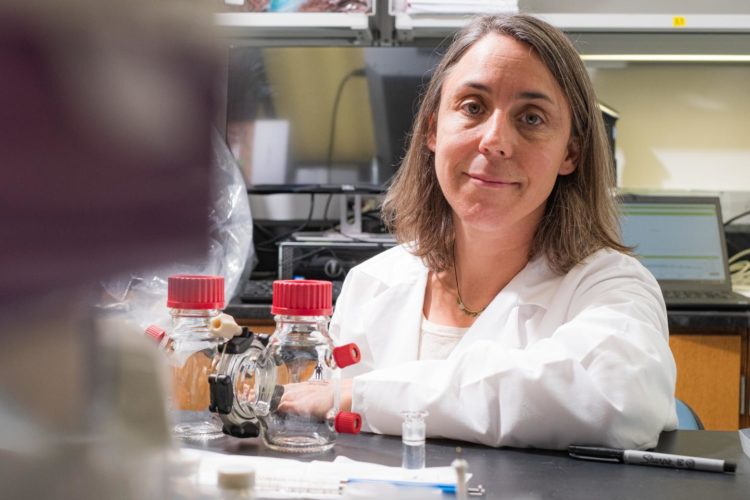Texas initiative brings synthetic biologist Caroline Ajo-Franklin to explore biological, inorganic interfaces

Credit: Jeff Fitlow/Rice University
HOUSTON – (Jan. 22, 2020) – A $6 million grant to Rice by the Cancer Prevention and Research Institute of Texas (CPRIT) has succeeded in bringing new blood to the university’s growing bioscience initiative.
Caroline Ajo-Franklin, an established biophysicist and synthetic biologist at the Lawrence Berkeley National Laboratory in California, has joined Rice’s Department of BioSciences as a professor.
Ajo-Franklin explores the nanoscale interface between living microbes and inorganic materials, particularly mechanisms that facilitate charge transfer, and the assembly of materials at that interface. She is expected to be a key member of the university’s Systems, Synthetic and Physical Biology program, which includes faculty in the Wiess School of Natural Sciences and Brown School of Engineering.
The culture of collaboration at Rice and with Texas Medical Center institutions — a key goal of the Vision for the Second Century, Second Decade — and the chance to expand her research in new directions were a strong draw, she said.
“The idea of coming to Rice was really attractive because there’s been such a push in synthetic biology,” said Ajo-Franklin, who joined the university last August in anticipation of the grant. “I saw an opportunity to help grow an excellent set of young assistant professors, with some more established faculty, into a really top-notch program.”
One cancer-related direction Ajo-Franklin expects to explore is the development of sensors that monitor chemotherapy agents in the body in real time. Two new studies from her Lawrence Berkeley lab point in that direction, she said.
In one published in Biotechnology and Bioengineering, she and her team made protein arrays that self-assemble into 3D bionanomaterials, Lego-like structures that can be programmed for use as catalysts, optical metamaterials and sensors.
“Bacteria use these proteins like armor,” Ajo-Franklin said. “If you look at the surface of bacteria, there’s this beautiful, repetitive structure all over. When we peel it off, it literally looks like chain mail, and that’s what we use to build layered materials.
“Because these proteins have been subject to evolution, we find they’re incredibly robust,” she said.
In the other study, which appeared in the American Chemical Society’s ACS Synthetic Biology, the team increased the bioelectronic performance of genetically engineered bacteria by manipulating a protein, CcmH, that controls the expression of a key type of extracellular electron transfer protein. In experiments with E. coli, the researchers were able to increase the flow of electrons to an electrode up to 77% or decrease it by 66%. They found that electron flow could be adjusted with even a single-point mutation in CcmH.
“If you didn’t know how complex biological systems are, this highlights it,” she said. “We make one amino acid change in one protein that affects how four other proteins are made, which then affects how electrons flow through the bacteria, which then affects how much current is produced by the system.”
Graduate student Lin Su, who came to Rice with Ajo-Franklin’s lab and is lead author of the study, said the work should lead to new opportunities to interface with biological systems. “I think it will be very powerful for biosensing, or you can use it in biosynthesis to control the behavior of different bacteria, either in the environment or the human gut,” he said.
Ajo-Franklin said the projects represent separate branches of her endeavors that she hopes to bring together at Rice. “These papers are sort of two halves of my work,” she said. “One is engineering biology to make materials, and the other is using biology to communicate with materials.
“We dream of being able to have bacteria make entire bioelectronic devices,” Ajo-Franklin said. “Imagine having bacteria seed something that doesn’t look like an iPhone but has some of the functionality of electronic devices. It’s hopefully a more sustainable way of making devices, and one that requires less energy.”
The grant to Rice was part of $38 million in funding announced Nov. 20 to recruit cancer researchers to Texas institutions.
###
This news release can be found online at https:/
Follow Rice News and Media Relations via Twitter @RiceUNews
Related materials:
Programmable assembly of 2D crystalline protein arrays into covalently stacked 3D biomaterials: https:/
Modifying cytochrome c maturation can increase the bioelectronic performance of engineered Escherichia coli: https:/
Caroline Ajo-Franklin: https:/
Systems, Synthetic and Physical Biology: https:/
Rice Department of BioSciences: https:/
Wiess School of Natural Sciences: https:/
George R. Brown School of Engineering: https:/
Images for download:
https:/
Caroline Ajo-Franklin joined Rice University as a professor of biosciences with funding from the Cancer Prevention and Research Institute of Texas. (Credit: Jeff Fitlow/Rice University)
https:/
Rice University graduate student Lin Su, left, and Caroline Ajo-Franklin, a professor of biosciences, developed a method to increase the bioelectronic performance of genetically engineered bacteria. (Credit: Jeff Fitlow/Rice University)
Located on a 300-acre forested campus in Houston, Rice University is consistently ranked among the nation’s top 20 universities by U.S. News & World Report. Rice has highly respected schools of Architecture, Business, Continuing Studies, Engineering, Humanities, Music, Natural Sciences and Social Sciences and is home to the Baker Institute for Public Policy. With 3,962 undergraduates and 3,027 graduate students, Rice’s undergraduate student-to-faculty ratio is just under 6-to-1. Its residential college system builds close-knit communities and lifelong friendships, just one reason why Rice is ranked No. 1 for lots of race/class interaction and No. 4 for quality of life by the Princeton Review. Rice is also rated as a best value among private universities by Kiplinger’s Personal Finance.
Jeff Falk
713-348-6775
[email protected]
Mike Williams
713-348-6728
[email protected]
Media Contact
Mike Williams
[email protected]
713-348-6728
Original Source
https:/





